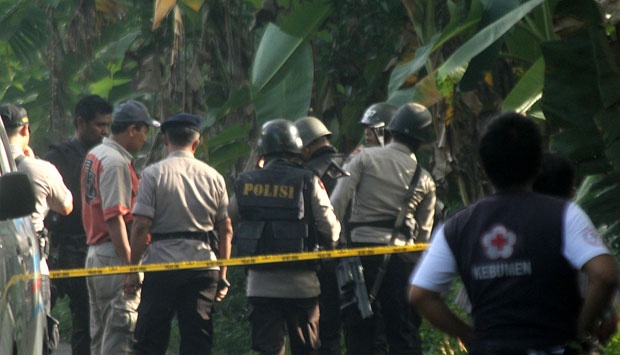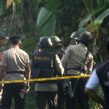
East Indonesian Islamist Militants Expand Focus and Area of Operations
Publication: Terrorism Monitor Volume: 11 Issue: 11
By:

The rise of Santoso (a.k.a Abu Warda, a.k.a. Abu Yahya) as Indonesia’s most wanted militant is forcing the country’s elite counterterrorist unit, Densus 88, to focus on his Sulawesi-based network – Mujahidin Indonesian Timur (MIT) (Jakarta Globe, November 5, 2012). Since 2012, MIT has targeted Indonesian government officials and security forces, but there are concerns that MIT could follow the path of Jemaah Islamiyah (JI), especially because Santoso was previously a commander in Jamaat Ansaru Tawheed (JAT), the successor group to JI.
The most recent incident highlighting MIT’s expanding reach occurred on May 9, when Densus 88 carried out a series of raids in Bandung, Kebumen and Batang on Java, the country’s most populous island (for Densus 88, see Terrorism Monitor, August 12, 2011). According to police, the seven militants who were killed and the 13 who were arrested had explosives prepared for attacks and had robbed banks to raise money for Santoso (Jakarta Post, May 10, 2013).
The Javan connection to Santoso shows that the legacy of JI and JAT founder Abu Bakr Ba‘asyir, even as the 73-year old Ba‘asyir serves a 15-year prison sentence for sponsoring a terrorist training camp in Aceh that Densus 88 raided in 2010. Santoso commands approximately 50 MIT fighters in the jungle area of Poso and Palu in Central Sulawesi (Straits Times [Singapore], February 13). The extent of the MIT’s network, however, is much larger and was exposed when two of Santoso’s men who murdered two police officers in May 2011 were arrested and revealed information about MIT to interrogators. Despite those two militants’ revelations, MIT’s attacks in Sulawesi continued in 2012, including:
· The murder of two police officers in Poso in August
· A bomb attack in North Poso, also in August
· A September bomb attack at a police station in Poso
· The November shooting of the North Poso Police station chief
· The shooting of four police Mobile Brigade members in North Poso in December, which Santoso claimed under the name of “Batalyon Abu Warda.” The attack was in revenge for the police closing a girls’ pesantren (Islamic boarding school) in Poso two months earlier (Jakarta Post, January 13).
As demonstrated by MIT’s attacks in Poso, the group tends to avoid operations that leave civilians dead, a contrast with JI’s former style. MIT is locally funded, in part through bank robberies and other criminal activities, including hacking foreign exchange trading websites (Jakarta Globe, December 24, 2012). JI, in contrast, was funded by al-Qaeda and beholden to al-Qaeda’s modus operandi of targeting foreign citizens and foreign interests, including attacks that killed more than 200 people, mostly foreigners, in the tourist district of Bali in 2002 and 2005 and in Jakarta in 2009.
JI was also different from MIT because JI’s members were deeply involved in transnational networks, especially in neighboring Malaysia and the Philippines. Malaysian nationals figured largely in the ranks of the JI, including the planners of the 2002 Bali bombing, Azahari Husin and Noordin Top Muhammad (killed by Densus 88 in 2005 and 2009, respectively), as well as Zilkifli bin Hir (a.k.a. Marwan), who was killed in an airstrike in Mindanao in 2012 (Zamboanga Times, May 25, 2012). The Indonesian Umar Patek, who was also a planner of the 2002 Bali bombings, frequently moved between Indonesia and Mindanao, where he joined and trained Abu Sayyaf fighters. He was captured in Abbottabad, Pakistan in 2011 while he was either en route to Afghanistan (according to his defense) or to meet Osama bin Laden to request funding for Southeast Asian militants (according to prosecutors) (The Nation [Jakarta], February 21, 2012).
While some MIT members have transnational networks, especially those who trained at Ba‘asyir’s camp in Aceh before 2010, MIT would be best described as “trans-Indonesian.” MIT’s name translates to “Mujahidin of Eastern Indonesia,” and although the group is mostly operational in Java and Sulawesi, it has spread through some of Indonesia’s eastern provinces, including:
· The Moluccas (Maluku) Islands, where Santoso reportedly fought in clashes between Muslims and Christians from 1999-2002 (Jakarta Post, January 6);
· West Nusa Tenggara, where in 2011 teachers from the Umar bin Khattab Islamic pesantren in Bima accidentally set off an explosion while making bombs, prompting Santoso, who was then based in Bima, to return to his native Poso (Jakarta Post, January 13);
· East Kalimantan, where in October 2012, computer hackers posted a letter from Santoso on the government’s website, in which Santoso adopted the name of the former al-Qaeda in Iraq leader by calling himself “Abu Mus’ab al-Zarqawi al-Indonesi.” The message challenged Densus 88: “You should not dare shoot and arrest our unarmed members… If you are really men, then face us” (Borneo Post, October 18, 2012).
If MIT builds networks with the Harakah Sunni untuk Masyarakat Indonesia (HASMI – Sunni Movement for Indonesian Society) or other Islamist groups that are associated with terror plots on foreign targets, it could be a sign that MIT will expand to foreign targets, just as JI did in the previous decade and HASMI’s leader, Abu Hanifa, attempted in 2012 (Salam Online [Jakarta], December 27, 2012).
Abu Hanifa was arrested in Central Java in 2012, while planning an attack on the U.S. Embassy, the Jakarta offices of U.S. mining company Freeport-McMoran and the U.S. Consulate in Surabaya in “retaliation” for the film “Innocence of Muslims,” which was produced by an Egyptian resident of California and satirized the life of the Prophet Muhammad (AP, October 27, 2012). Indonesia’s national police spokesman suggested that the MIT connected with Islamists interested in foreign targets when he said he suspected that the plotters of an attack on the Myanmar embassy in Jakarta on May 3 and the MIT cells that were broken up in Java on May 9 were connected (Australian.com, May 9). At a minimum, there is concern that members of HASMI and other Islamist groups that are notorious for attacking Ahmadiya mosques, Christian churches and “un-Islamic” institutions, such as alcohol retailers, could become part of the recruiting pool for MIT (Jakarta Globe, May 11).
The “networks of intolerance” that are undermining Indonesia’s stability are, however, being countered by several forces. First, Indonesia’s economy continues to boom and could become the world’s sixth or seventh largest economy by 2030 according to some projections (Jakarta Globe, November 27, 2011; Mckinsey.com, September 2012). Second, mainstream academic and religious scholars continue to challenge radical views in the public sphere. At conferences in January and March lecturers from the renowned Gadjah Mada University and State Islamic University Bandung discussed the release of Abu Bakr Ba‘asyir’s new book, Tadhkirot 2. In the book, Ba‘asyir calls the Indonesian government “apostate” for cooperating with the “infidel” United States. The lecturers argued that Ba‘asyir’s ideas were too “provocative” and that his call for Shari’a to replace democracy could compel majority-Christian areas and majority-Hindu areas to secede, leading to the disintegration of Indonesia. [1] Finally, the Islamists are hurting their own cause, with many Muslims in the country perceiving Shari’a Law as practiced in the special region of Aceh to be anachronistic, especially for women, and an example of what not to do in the rest of the country.
The key to defeating MIT and other Islamist groups requires not only Densus 88’s aggressive counter-terrorism work, but also a whole-of-society approach, in which Indonesians expose the Islamists’ ideology as a false hope that would offset the economic and societal gains the majority of Indonesians have worked for since the country entered the democratic era in 1999.
Jacob Zenn is an analyst of geopolitical trends across multiple regions and frequently writes for Terrorism Monitor. A fluent speaker of Bahasa Indonesia and former student of Universitas Negeri Malang, he carried out field research in Java and Sulawesi in May 2013.
Note
1. Author’s Interviews with lecturers and students in Jakarta, Surabaya and Malang in May 2013.





